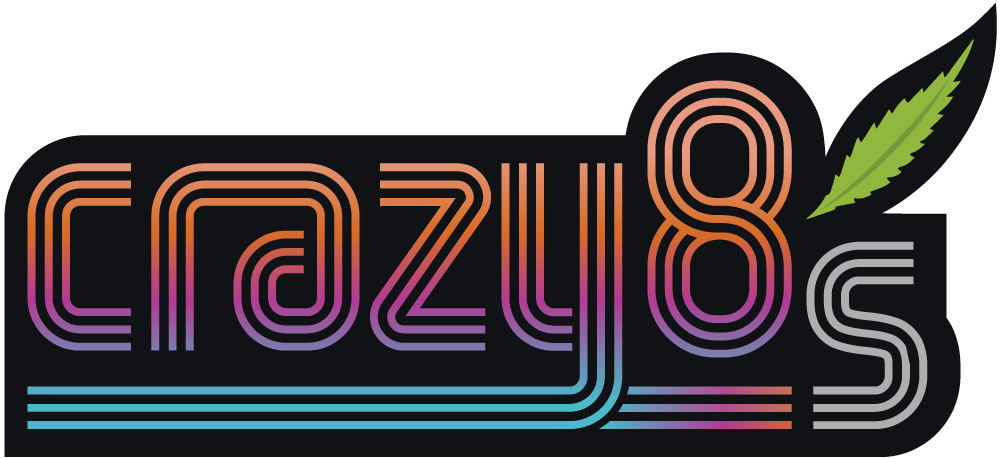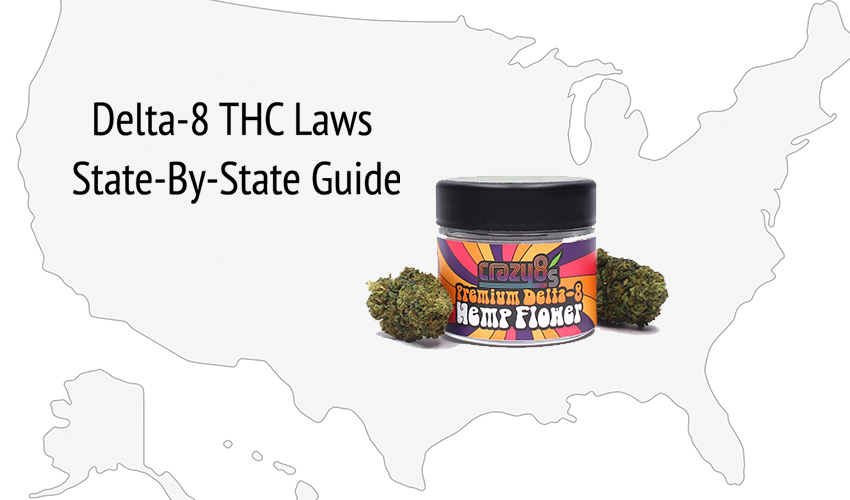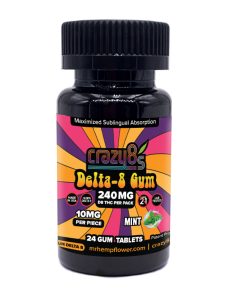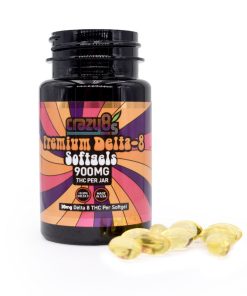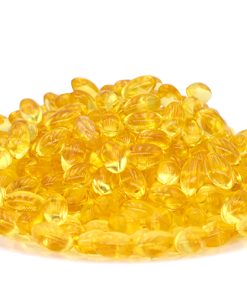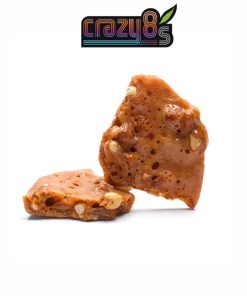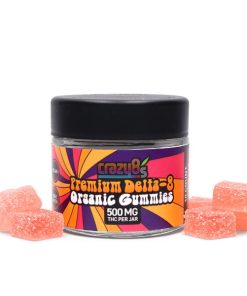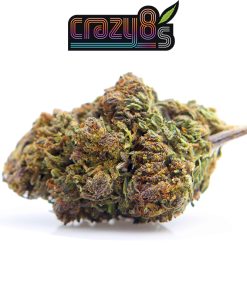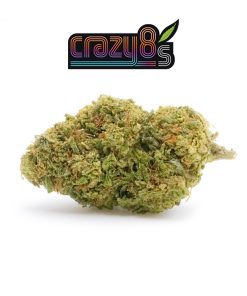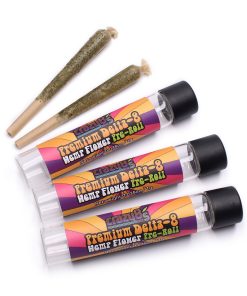Delta 8
Where Is Delta-8 THC Legal or Banned? State-by-State Legality Guide [Detailed]
Are you confused about the legality of Delta-8 in your state? This guide provides a detailed look at current D-8 state laws, bans, and restrictions.
It only took a year for Delta-8 THC to become a sensation — but its legality remains in limbo. Despite predictions that the reign of this compound is coming to an end, Delta-8 remains available in around 30 states. Sixteen to eighteen states have restricted or banned this cannabinoid, while others are still considering options around its legality.
Let’s look at the current laws and regulations in each state and the legal status of this cannabinoid on a federal level.
Is Delta-8 Legal in All 50 States?
The legal status of D-8 on a federal level is murky. Therefore, many states passed their own laws that legalized, banned, or restricted the use of this compound. Generally, states fall into these four categories:
- States where it’s entirely legal
- States where it’s regulated as recreational cannabis
- States where its legality is murky (gray)
- States where it’s completely banned or illegal
Let’s look at the laws of each state separately.
You will notice that state laws are often confusing, contradicting, and susceptible to change. Many states allow the sale of hemp-derived Delta-8 only as THC for recreational use.
States Where Delta-8 THC is Fully Legal
These states have adopted a friendly attitude and regulations towards hemp-derived D-8 THC. In these states, you should be able to purchase D-8 THC products with no issue.
Alabama
Delta-8 THC is legal in Alabama. The state was close to banning hemp D-8 and D-10 THC products with Alabama House Bill 2. This bill passed in April 2021, and luckily, didn’t include the amendment that was supposed to ban these compounds. Currently, the state is in the process of legalizing medical marijuana.
California
Delta-8 THC is legal in California. Like many recreational cannabis states, the Golden State is working on regulating hemp D-8 as recreational cannabis. If Bill AB-45 passes, users may be allowed to buy D-8 products sold at licensed dispensaries.
Florida
Delta-8 THC is legal in Florida. Florida is one of the first states that authorized the sale of hemp-derived D-8 and all hemp extracts and derivatives that contain less than 0.3% Delta-9 THC. Meaning, hemp-derived Delta-10 and Delta-7 are also legal in the Sunshine State.
Illinois
Delta-8 THC is legal in Illinois. The state is currently working on passing legislation that will require proper testing and labeling of all cannabinoid products before being sold.
Indiana
Indiana doesn’t explicitly prohibit the sale of hemp-derived Delta-8 THC. Although D-8 is presumably legal in this state, there are no laws that ban its sale. Therefore, if derived from hemp, it’s legal under the Farm Bill.
Maine
Delta-8 THC derived from hemp and marijuana is legal in Maine. The state is one of the most cannabis-friendly states that legalized marijuana in 2016.
Maryland
Delta-8 THC is legal in Maryland. The state hasn’t explicitly banned or restricted the sale of D-8 THC derived from hemp, which makes this cannabinoid legal under the Farm Bill.
Massachusetts
Delta-8 THC is legal in Massachusetts. The state also hasn’t explicitly outlawed or restricted the sale of hemp-derived D-8 THC, so this cannabinoid is legal under the Farm Bill.
Minnesota
Delta-8 THC is legal in Minnesota. Like other states, Minnesota hasn’t banned the use and sale of this cannabinoid. But, it does prohibit the possession of a “liquid mixture” containing THC. Users who have a medical license can also obtain marijuana-derived D-8 THC.
Missouri
Similar to other states, Missouri hasn’t explicitly outlawed hemp-derived Delta-8 THC. Back in 2010, the state passed legislation that banned synthetic cannabinoids. Considering that D-8 THC could be deemed “synthetic,” there’s a chance the state will ban it in the future.
New Hampshire
Delta-8 THC is legal in New Hampshire. The state hasn’t introduced legislation to ban or restrict this cannabinoid. New Hampshire decriminalized marijuana, so being caught with a D-8 THC product with over 0.3% THC is not strictly punished.
New Jersey
Delta-8 THC is legal in New Jersey. The state is one of the latest to legalize recreational marijuana. Hemp-derived products with less than 0.3% THC are legal in New Jersey.
New Mexico
Delta-8 THC is legal in New Mexico. The state is another one of the latest that legalized recreational cannabis in 2021.
North Carolina
Delta-8 THC is legal in North Carolina. The state does hold a bit of a conservative view towards cannabis, so it’s best to stick to hemp-derived products. For now, North Carolina hasn’t explicitly banned the sale of hemp-derived D-8 THC.
Ohio
Delta-8 THC is legal in Ohio. The state also hasn’t specifically outlawed the sale of D-8 THC products. So, as long as the product is derived from hemp and contains less than 0.3% Delta-9, it’s legal in Ohio.
Oklahoma
Delta-8 THC is legal in Oklahoma. The state passed a new marijuana law that excludes D-8 and Delta-10 THC from the definition of marijuana. Therefore, hemp-derived D-8 THC doesn’t fall under the regulations of the Oklahoma Medical Marijuana Authority (OMMA).
Oregon
Delta-8 THC Is legal in Oregon for adults over 21. The state created a new category of legal, adult-use cannabinoids regardless if derived from hemp or marijuana.
House Bill 3000 that passed into law in July 2021 included D-8, D-9, and any intoxicating, artificially derived cannabinoid in the new category of adult-use cannabinoids. Therefore, the sale of D-8 THC to minors is prohibited.
Pennsylvania
Delta-8 THC is legal in Pennsylvania. Only hemp-derived D-8 THC products are considered legal.
South Carolina
Delta-8 THC is legal in South Carolina. The state hasn’t specifically banned the use or sale of this cannabinoid if derived from hemp.
South Dakota
Delta-8 THC is legal in South Dakota. If derived from hemp, D-8 THC is seemingly legal like in other states that haven’t issued a ban on this compound.
Tennessee
Delta-8 THC is legal in Tennessee. For now, the state hasn’t explicitly banned the sale of this cannabinoid. Although it does outlaw synthetic cannabinoids and has been quite intolerant of cannabis, hemp-derived D-8 is freely sold in Tennessee.
Texas
If made from hemp, Delta-8 THC is legal in Texas. In 2021, the state had a few attempts at banning D-8 THC (House Bill 3948 and 2593), but both failed.
Virginia
Delta-8 THC derived from hemp is legal in Virginia. This state also legalized recreational cannabis in 2021.
Washington
Delta-8 THC is legal in Washington. Considering cannabis for recreational use is legal in this state, the Washington Liquor and Cannabis Board (LCB) is likely looking to regulate this cannabinoid as such.
West Virginia
Delta-8 THC is legal in West Virginia. The state hasn’t explicitly banned the sale of this cannabinoid. So, if derived from hemp, it’s legal in West Virginia.
Wisconsin
Hemp-derived Delta-8 THC products are legal in Wisconsin. The state Department of Agriculture, Trade and Consumer Protection is likely looking to regulate D-8 THC in accordance with federal law.
Wyoming
Delta-8 THC is legal in Wyoming. The state hasn’t explicitly banned the sale of hemp-derived D-8 THC.
States that Regulated Delta-8 THC as Recreational Cannabis
These states permit the use of cannabis for recreational purposes and have regulated D-8 THC as part of their licensed cannabis system.
Connecticut
Connecticut regulated Delta-8 THC as cannabis, so you can buy it from licensed cannabis retailers. The state passed an Act in July 2021 that closed the D-8 loophole by prohibiting unlicensed businesses from selling hemp-derived D-8 with a THC concentration that exceeds 0.3%.
Michigan
Delta-8 THC and other THC isomers are regulated in Michigan as recreational cannabis. As of October 2021, it will be illegal to sell D-8 and other THC isomers outside of licensed cannabis stores.
Nevada
The state recently added Delta-8 THC in its definition of THC, which now refers to both D-8 and D-9 THC. Meaning, D-8 THC products made from hemp or marijuana are considered THC and must be registered under the state’s THC licensing system.
States Where Delta-8 THC is in a Legal Gray Area
These states either explicitly ban/restrict the use of D-8 THC or simply have confusing laws on hemp-derived D-8.
Georgia
Delta-8 THC is seemingly legal in Georgia, but the state has a hostile attitude towards these products. This state banned synthetic cannabinoids in 2010, and since D-8 started selling, it has raided more than a few hemp shops.
Kansas
Kansas also holds Delta-8 THC in the legal gray area. The state has yet to introduce legislation regarding D-8 THC, and its legality remains uncertain because Kansas outlaws synthetic cannabinoids.
Hawaii
Delta-8 THC is not explicitly banned in Hawaii, but it’s definitely in the legal gray area. The Aloha state adopted new rules in August 2021, which ban smokable hemp, vapes, hemp-containing gummies, foods and beverages, etc. The only products allowed for sale are hemp extracts in the form of tinctures, tablets, capsules, powder, and topicals.
Nebraska
Delta-8 THC is in the legal gray area in this state. Nebraska classified all tetrahydrocannabinols (including D-8) as a Schedule I drug. The state allows the sale of hemp-derived products as long as they contain Delta-9 THC content below federal limits.
States that Banned and/or Restricted Delta-8 THC
These states have fully banned or restricted hemp-derived D-8 THC and, in most cases, THC isomers like Delta-10 and Delta-7.
Alaska
Delta-8 THC is illegal in Alaska. The Last Frontier classifies tetrahydrocannabinols as Schedule IIIA controlled substances. Like other states, it’s expected Alaska to legalize hemp-derived D-8 THC as part of its legal marijuana system.
Arizona
For now, Delta-8 THC is illegal in Arizona. But, the state legalized recreational marijuana in 2021, so the law that bans any form of tetrahydrocannabinol is expected to change.
Arkansas
Delta-8 THC is illegal in Arkansas. State law is pretty conservative regarding marijuana and classifies all THC substances and their isomers as Schedule VI drugs.
Colorado
Delta-8 THC is illegal in Colorado. The state’s Department of Public Health and Environment stated that “chemically modifying or converting naturally occurring hemp cannabinoids doesn’t align with the definition of ‘industrial hemp product.’”
Delaware
Delta-8 THC is illegal in Delaware. The state prohibits the sale of all forms of THC that the Food and Drug Administration (FDA) hasn’t approved.
Kentucky
Delta-8 THC is illegal in Kentucky, as stated in a letter by the state’s Department of Agriculture. The reality is, hemp D-8 products are available in Kentucky, and this presence caused many police raids. Kentucky outlaws tetrahydrocannabinols on its list of Schedule I controlled substances.
Idaho
Delta-8 THC is completely illegal in Idaho. The state was the last one to legalize hemp and has quite strict cannabis laws that ban all tetrahydrocannabinols.
Iowa
Delta-8 THC synthesized from CBD is illegal in Iowa and can be charged as marijuana. On the other hand, D-8 extracted from hemp directly is legal in the state. Iowa legalized hemp products in 2020 but banned smokeables and vapes.
Louisiana
Delta-8 is illegal in Louisiana. In August 2021, the Governor signed HB 640, which bans ‘consumable hemp products’ that don’t contain naturally occurring cannabinoids. Louisiana law also caps the amount of ‘Total THC’ in a product to 1%.
Mississippi
Delta-8 THC is illegal in Mississippi. The state has strict laws regarding cannabis and bans all forms of THC.
Montana
Delta-8 THC is illegal in Montana. The state law outlaws all forms of THC, including isomers and synthetic substances.
New York
Delta-8 THC is officially illegal in New York. The state issued a ban that prohibits processors from using synthetic cannabinoids, or “Δ8-tetrahydrocannabinol or Δ10-tetrahydrocannabinol created through isomerization” in the processing of any cannabinoid hemp product. Judging by this decision, it’s likely that New York will regulate this cannabinoid as part of its legal marijuana system.
North Dakota
Delta-8 THC is illegal in North Dakota. HB 1045 changed the definition of THC to include D-8 and banned the substance and its isomers Delta-7 and Delta-10. The bill also re-defined hemp and hemp-derived products to contain no more than 0.3% THC in any form.
Rhode Island
Delta-8 THC is illegal in Rhode Island. The state’s law prohibits the sale of products for consumption containing this cannabinoid and any type of THC.
Utah
Delta-8 THC is illegal in Utah. All types of THC, isomers, and synthetic equivalents are listed as controlled substances in the state’s Controlled Substances Act.
Vermont
Delta-8 THC is illegal in Vermont. The state’s Agency of Agriculture, Food and Markets stated in April 2021 that the manufacture, possession, and sale of D-8 THC is prohibited under state law if it’s synthetically made from hemp.
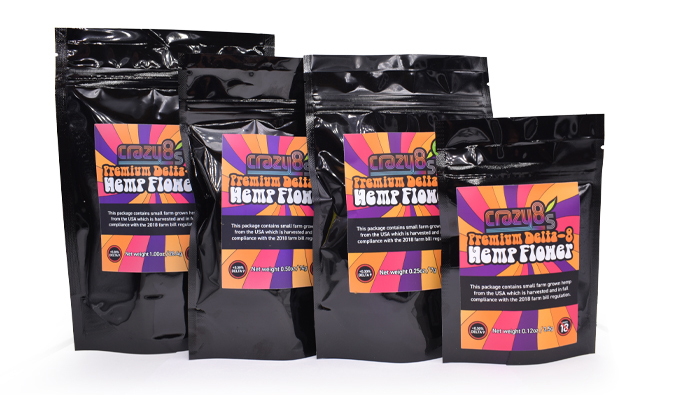
What is Delta-8 THC?
Delta-8 THC is one of the 100+ naturally occurring cannabinoids in hemp. It’s a minor cannabinoid and a form of THC that, until recently, was in the shadow of the main THC compound in cannabis, Delta-9.
D-8 shares a very similar chemical structure with D-9 and, together with Delta-7 and Delta-10, is one of the four most popular THC isomers.
Chemically, the main difference between D-8 and D-9 is in the placement of the double bond. Namely, D-9 has a double bond on the 9th carbon in the chain, while D-8 on the 8th. During the aging process of cannabis, the double bond moves from the ninth to the eighth carbon, and D-9 degrades into D-8.
Regarding potency, research shows that Delta-8 is about 66% as potent as Delta-9 and shares similar effects. Experts have a theory that the double bond determines the way these cannabinoids interact with CB1 receptors in the brain. If correct, it indicates that the differences in potencies come from differences in the placement of the double bond.
Aside from lower potency, D-8 THC appears to cause common side effects like anxiety, paranoia, and hallucinations to a lesser extent than D-9 THC. This compound gives a mild “body high” without the typical THC side-effects, which greatly contributed to its popularity.
The Delta-8 Legal Controversy
D-8 THC provides a legal way to get high, even in states where cannabis is illegal.
Cannabis is a controlled substance federally, so you’re probably wondering how this compound can be legal?
Experts claim a loophole in the Farm Bill allows the manufacture and sale of D-8 when derived from hemp. Hemp is the non-intoxicating variety of cannabis that became legal on a federal level thanks to the Farm Bill.
Under the bill, hemp and hemp products cannot contain over 0.3% Delta-9 THC. Everything that surpasses the D-9 THC limit, it’s considered marijuana and is therefore illegal.
That said, the hemp plant does have natural levels of D-8 THC that are insufficient for organic extraction (less than 0.1%). So, to produce it in large quantities, manufacturers make D-8 from hemp CBD through the special process of isomerization or conversion of one molecule into another.
Lawmakers didn’t predict the potential for growth of the hemp industry and all the loopholes that may arise. While some claim that D-8 is derived from hemp and therefore illegal, others claim that as an intoxicating compound, D-8 is more marijuana-like and therefore illegal.
That’s why many states have decided to ban or regulate this compound as part of the legal cannabis market.
The second major question concerning the controversial legality of this cannabinoid is that it may be considered “synthetic.” As mentioned, D-8 is not naturally extracted from the hemp plant but made in a lab from hemp CBD. While the process of creating one cannabinoid from another is not entirely natural, you could argue that it’s not entirely synthetic either.
Truly synthetic cannabinoids like Spice and K2 are entirely man-made, dangerous, and banned by the Synthetic Drug Abuse Prevention Act. The release of the DEA’s Interim Rule on hemp confirmed the same thing but didn’t go into too much detail on the legal status of D-8 federally.
Future Legality of Delta-8 THC
Is it legal or illegal? Depends on who you’re asking.
Currently, D-8 is in a legal gray area on a federal level. The DEA added D-8 to its Orange Book of controlled substances, but that still doesn’t make it illegal because only the federal government can outlaw D-8 on a federal scale.
While it’s possible to see a federal ban, it’s very unlikely because all things point towards the legalization of cannabis.
State laws are constantly changing, so the legality of this compound depends on the state where you live. As of this writing, it seems like most states will regulate this cannabinoid as part of their recreational or medical marijuana market.
There’s a possibility that we’d only be able to buy this cannabinoid from licensed businesses that properly test and label their products. This will increase the safety of D-8 products offered on the market.
But, that doesn’t mean you can’t find brands that currently offer products made under those standards.
Where to Buy Delta-8 THC
A growing number of brands are selling D-8 THC. Unfortunately, only a handful are trustworthy and dedicated to providing high-quality, effective, and safe products.
Crazy8s is the leading provider of premium D-8 THC products. We offer products for everyone’s taste, including Delta-8 flower, gummies, vape carts, capsules, and more.
A certified lab tests each product batch so you can purchase with confidence that your D-8 is pure and labeled for potency.
FAQ’S
D-8 is currently available in around 30 states, while the rest either completely restrict it or exist in the gray legal area.
If it’s legal in your state, you can order D-8 THC online. Most vendors sell it to almost every state with more lax laws.
If consumed in the same dose, D-8 is half as potent as D-9 THC. So, no, it’s generally milder.
Laws are moving towards cannabis legalization, so it’s more likely to get regulated as part of the legal medical or recreational cannabis market than getting fully banned.
